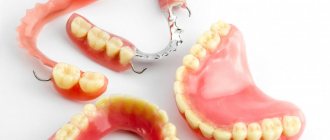30.08.2017
Treatment of toothache during pregnancy is always associated with a number of difficulties. It's no secret that most medications are contraindicated for a woman during the entire period of bearing a child. The substances contained in the tablets can adversely affect the condition and development of the fetus, so the expectant mother is advised to closely monitor her health and avoid contact with sick people. However, nine and a half months is quite a long time, so it is rare that a woman manages to do without medication during this entire period.
As for toothache during pregnancy, it often overtakes a woman by surprise. This can happen far from the city or in the middle of the night, when there is no way to see a doctor. In this case, the pain is so sharp and severe that it is impossible to endure it. A woman’s first reaction is to want to take a pill of her usual analgesic, but how safe is it?
In this article we will tell you why pregnant women have toothache, and what remedies for toothache are allowed during pregnancy.
Why does toothache occur so often during pregnancy?
Each woman’s well-being during pregnancy is purely individual. However, expectant mothers can really be bothered by such a problem as toothache. Women who have always had a perfect smile sometimes develop caries and gum inflammation, and frequent dental visitors note an exacerbation of chronic diseases. The fact is that pregnant women's teeth are really very vulnerable. Lack of vitamins and minerals, metabolic disorders in the body, changes in hormonal levels, increased acidity of the oral cavity as a result of toxicosis - all these are factors that can negatively affect dental health and provoke caries and toothache in pregnant women.
Gingivitis in pregnant women: the essence of the pathology
Sometimes the cause of aching sensations in the teeth is gum disease, including gingivitis during pregnancy. According to statistics, it accompanies pregnancy in 45% of women. And as such, there is no risk category in this regard: it doesn’t matter how old the pregnant woman is, what chronic diseases she has, or how the pregnancy progresses. Gums become inflamed due to hormonal changes in the female body and reduced immunity during these months.
Gingivitis in pregnant women
Possible causes of gingivitis:
- hormonal changes - the level of progesterone and gonadotropin increases, and this contributes to the inflammatory process in the oral cavity. To be more precise, the mucous membrane becomes inflamed. After childbirth, hormonal levels gradually return to prenatal norms, signs of gingivitis disappear;
- deficiency of minerals and/or vitamins. It is difficult to determine which microelement is insufficient in a pregnant woman’s body - this cannot be determined only by the characteristics of eating behavior. But vitamin deficiency itself, as well as changes in metabolic processes, can provoke gingivitis.
Very often, vitamin deficiency accompanies toxicosis in the first weeks of pregnancy. Therefore, the most common time when gingivitis appears is 8-12 obstetric weeks.
Many pregnant women experience gingivitis
Gingivitis in pregnant women
| Signs | Degrees | Treatment |
| Swollen, hyperemic gums that partially (and sometimes completely) cover the crown of the tooth. Pain when pressing on the gum. Tooth enamel with heavy plaque. Repulsive odor from the mouth. | Mild degree - if the gums do not cover more than 1/3 of the dental crown. Medium degree - the coronal part is only half covered by the gum. Severe – the gums have covered more than 1/2 of the tooth crown. | Professional hardware teeth cleaning. Taking anti-inflammatory drugs as prescribed by your doctor. Physiotherapeutic procedures. |
Acute gingivitis
Gingivitis rarely leads to severe toothache, but aching sensations may well appear. It is impossible to cure gingivitis completely, because the mechanisms that lead to it are explained by pregnancy itself. Therefore, you can simply reduce its manifestations to a minimum, and this can only be done in a specialist’s office.
What symptoms should you see a doctor for?
Prevention is the key to health. Regular dental examinations every six months can save you from serious dental problems. Therefore, I recommend visiting a dental clinic both at the planning stage of pregnancy and during it. And if you are worried about, for example, toothache from cold and hot, you should immediately consult a dentist. The smallest carious cavity is a source of infection, which is an additional burden on the body of a pregnant woman. Moreover, if this caries is not treated on time, pulpitis may develop, accompanied by severe pain symptoms.
If possible, before visiting the dentist, consult with the gynecologist leading your pregnancy. Be sure to inform your dentist about your situation, and best of all, go to a clinic equipped with the necessary equipment and staffed with highly qualified specialists who can provide assistance without harming the expectant mother and child.
How does a painkiller pill work?
When inflammation develops in the infected pulp or periodontal tissues, they produce enzymes that signal problems - prostaglandins. Prostaglandins go to pain receptors - nerve endings, and “turn on” pain.
Analgesics block the release of signaling enzymes, so pain disappears some time after taking them. The cause of toothache is an infection or inflammatory process that is not eliminated, and unpleasant symptoms reappear after a while.
When is the best time to treat teeth for pregnant women?
The most favorable period for a woman and the safest period for a child for dental treatment during pregnancy is the second trimester. But, if you are suffering from toothache or there is a doctor’s prescription, measures can be carried out in the first and even in the third trimester (the only exception may be complex surgical operations). It is important that the expectant mother is as comfortable as possible during treatment. In our clinic, each office is equipped with a soft orthopedic chair and special lumbar bolsters, which allows you to comfortably carry out full treatment even in the third trimester of pregnancy.
In the early stages
In the first trimester of pregnancy (1-13 weeks), all organs and systems of the baby are formed. Medications during this period can disrupt the normal development of the fetus, so it is better to avoid them. But, if acute pain strikes you late or on a holiday, the doctor will prescribe:
Ibuprofen (Ibuprom, Nurofen), tablets
In addition to the analgesic effect, it also has an anti-inflammatory effect. Ibuprofen will help eliminate the symptoms of chronic pulpitis and inflammation of the ligaments of the tooth, periodontitis. 1 tablet contains 200 mg of active ingredient, and can be taken no more than 3 times a day.
For expectant mothers suffering from frequent attacks of heartburn, toxicosis or stomach pain, ibuprofen preparations are not suitable - they are made on the basis of propionic acid and irritate the gastrointestinal tract.
Dental drops
Contains essential oils of camphor, peppermint and valerian infusion. They have analgesic, anti-inflammatory and bactericidal effects. A cotton swab moistened with 2-3 drops is placed for 5-10 minutes in the tooth cavity destroyed by caries. This relieves pain from deep caries and pulpitis.
The use of dental drops requires precautions: if ingested, they can provoke an attack of vomiting, and if in contact with mucous membranes, cause a burn.
Gel Kamident
A combination of substances with analgesic (lidocaine), anti-inflammatory (chamomile) and antibacterial (thymol) properties. A drop of gel is applied to the root zone of the diseased tooth and rubbed in. The gel reduces sensitivity in inflamed gums, which helps reduce pain during gingivitis, stomatitis and periodontitis.
How to relieve toothache during pregnancy?
What to do at home if your tooth hurts a lot? Today, obstetricians and gynecologists around the world allow women to take certain tablets for toothache during pregnancy. For example.
- Paracetamol
There is a stereotype that paracetamol is an exclusively antipyretic drug that is taken exclusively for ARVI and influenza. In fact, it has a pronounced analgesic effect, so it will help get rid of toothache. Moreover, despite the fact that the drug penetrates the placenta, it does not pose a threat to the fetus. - No-spa
But no-spa for toothache will not cause harm, but it will not be beneficial either. The thing is that drotaverine hydrochloride, the active substance at the heart of the drug, is an antispasmodic, responsible for relaxing smooth muscles. But it is powerless to have a pain-relieving effect. However, for women prone to self-hypnosis, taking No-shpa can bring relief according to the placebo principle.
What medications that we are used to in everyday life should not be taken during pregnancy, even with severe toothache? Firstly, analgin, which negatively affects the blood count, is prohibited. Secondly, you should not resort to Nurofen, which can cause oligohydramnios in a pregnant woman. Thirdly, drugs such as citramon or askofen are not recommended, since they contain a large dose of caffeine.
If we are talking about the need to relieve toothache during pregnancy in the conditions of treatment in the dentist’s office, then you should not be afraid that you will have to endure the pain. Only anesthesia using adrenaline, which can cause an increase in blood pressure, is strictly prohibited. But local painkillers based on mepivacaine or articaine will not cause harm.
Contraindications to the use of Lidocaine (spray, injection) during pregnancy
Before using any drug, the doctor should check with the woman for possible contraindications. For Lidocaine, this list is as follows:
- Individual hypersensitivity reaction.
- Low blood pressure.
- Pathologies of the liver and/or kidneys.
- Disturbances in the functioning of the cardiovascular system.
Lidocaine during pregnancy - reviews of the drug
Despite the restrictions on the use of Lidocaine during pregnancy, many doctors still use this drug for anesthesia during various medical procedures. The experience of most women who have already given birth is based on a single administration of the drug. No negative phenomena were noted, the children were born on time and without developmental deviations. A number of women noted that the drug was prescribed as part of an antibacterial “cocktail” in the second half of pregnancy. There were also no significant negative consequences noted.
To summarize, it is worth noting that despite the warnings of the drug manufacturers, the drug still finds use in such a category of patients as pregnant women. It is difficult to answer for sure whether Lidocaine is harmful during pregnancy. While there are potential risks from exposure of the drug to the baby in the womb, there is no statistical data regarding a higher number of complicated pregnancies after a single use of Lidocaine. The drug is a drug of last resort, so you should not use it unless absolutely necessary, especially since the modern pharmaceutical market can offer safer alternatives (for example, Ultracaine).
What is the prevention of dental diseases in pregnant women?
Following a few simple rules will help you avoid toothache during pregnancy. A woman planning to become a mother definitely needs to see a dentist and undergo a complete sanitation of the oral cavity, that is, to cure all her teeth and put her gums in order. Already during pregnancy, first of all, it is necessary to adhere to a balanced diet and additionally take a complex of vitamins and minerals recommended by the doctor. You need to be especially careful about your oral hygiene: it should include not only regular brushing of your teeth with a brush and toothpaste, but also the use of interdental floss. During pregnancy, it is important to see a dentist: it is advisable to visit the clinic at least twice during the 40 weeks of pregnancy.
The effect of ibuprofen on the fetus
Scientists from Harvard University (USA) conducted studies that examined the connection between the use of ibuprofen during pregnancy and nervous disorders in children at an early age. Thus, in a study involving 1,225 pairs of mothers and children, scientists assessed the use of ibuprofen, as well as paracetamol, in early and middle pregnancy and in newborns. This experiment showed that prenatal and postnatal exposure to ibuprofen and paracetamol leads to behavioral disturbances in children and hyperactivity as they grow older.
Prices for aesthetic dentistry services
Consultation with a dentist - therapist Free Treatment of caries with placement of a light polymerization filling from 3,000 rubles. up to 4200 rubles. Treatment of pulpitis of the 1st tooth from 3500 rubles. up to 4000 rubles. Treatment of pulpitis of 2 teeth from 4750 rubles. up to 6,000 rubles. Treatment of pulpitis of the 3rd tooth from 6,400 rubles. up to 8200 rubles. Light polymerization filling from 2800 rubles. up to 3500 rubles. Artistic restoration from 4950 rubles. up to 6900 rub. Professional hygiene (removal of dental plaque, Air-flow, polishing). Price for one jaw RUB 2,500. ZOOM whitening RUB 15,000.Causes of gum disease
Oral discomfort during pregnancy is often associated with gingivitis. It occurs mainly due to poor oral hygiene - resulting in the formation of plaque. Another reason for the problem is hormonal changes.
Gums begin to hurt from the 3rd month of pregnancy. They change color from red to blue, swell, and bleed less often. Unpleasant sensations in the mouth may occur during eating or at rest. Sometimes ulcers appear. In the second half of the term, the condition of the mouth may deteriorate sharply - the gingival papillae and gum edges become significantly larger.
The gums near the tooth hurt (including after its removal) and for some other reasons.
All of them are complications and require prompt intervention by a specialist:
- Alveolitis is an inflammation of the hole left after tooth extraction. The presented problem arises due to non-compliance with the doctor’s recommendations. After tooth extraction, the problem arises when an infection penetrates the injured tissue, causing swelling and other complications.
- Hematoma is an accumulation of pus in the blood that has accumulated in the soft tissues.
- Trigeminal neuritis. The gums also hurt when the trigeminal nerve is injured. Visually it does not change.
- Remains of cysts, dental roots. In some cases, the pain is due to the fact that the specialist has not removed all the remains. This causes inflammation of soft tissues, headaches, and swelling.
There are cases where women develop periodontal disease due to long-term use of any medications. For example, patients with epilepsy receive special medications that reduce the amount of saliva produced. As a result, their teeth are left with virtually no protection.
What to do if your gums hurt? Seek help from a dentist for medication or surgery.
Traditional methods of treatment
If there is swelling due to a wisdom tooth cutting out or an infection, use special preventive baths. Decoctions of sage, chamomile, and chlorhexidine solution are excellent.
You can also try some other methods if your wisdom tooth is growing:
- Place a few drops of garlic juice on the affected area. Wait a couple of minutes and rinse your mouth.
- Rinse your mouth with a solution of furatsilin or soda.
- Apply ice to the outside of your cheek.
- Perform a massage.
What else to treat? Various applications and masks help a lot. For example, a mask made from raw beets. The grated vegetable is applied to the affected area for 20 minutes.
Another excellent folk option is tar applique. Take a small amount of birch tar and use it to brush your teeth at night. After a couple of days the problem will disappear.
Potato juice can cope with inflammation quickly. Take potatoes, wash them with a stiff brush, and douse them with boiling water. Then all that remains is to grate it and apply it to the problem area for 25 minutes.
An interesting recipe - a mixture of bergenia, galangal, clove spices and tooth powder. All components need to be taken and ground. Then she brushes her teeth in the morning for a couple of minutes.
You can prepare healing gum from lemon juice, mint essential oil, honey and beeswax. The mixture is heated on the stove until it becomes homogeneous. All you have to do is wait until it cools down, make lozenges, and you can chew.
A simple way is to rinse your mouth with 10-day old kefir. The product is diluted in the ratio of half a glass of water per glass of kefir. It is necessary to rinse the affected area with it as often as possible.
In the morning and before bed, you can rinse your mouth with mumiyo (take 3 g of the substance and dissolve in 100 ml of water). The duration of use of the product is about 21 days.
You can get rid of ulcers by rinsing your mouth with infusion of golden mustache. The leaves of the plant are ground and poured with boiling water. Sea salt is added to the mixture, after which you can rinse.
Applying heat to the affected area is strictly prohibited! This will only increase the spread of pathogenic bacteria. There is also no need to apply painkillers to the painful area to prevent irritation.











